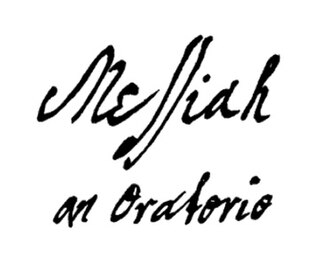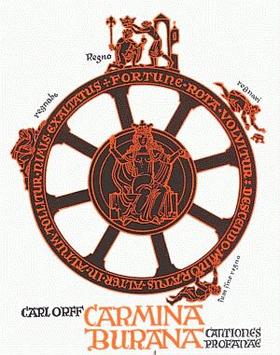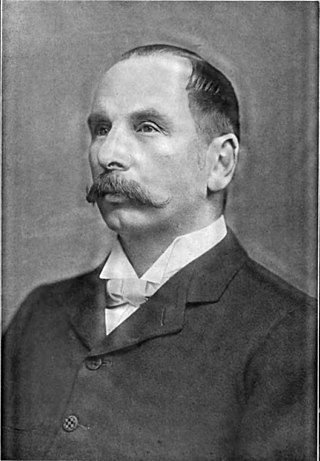Related Research Articles

Messiah is an English-language oratorio composed in 1741 by George Frideric Handel. The text was compiled from the King James Bible and the Coverdale Psalter by Charles Jennens. It was first performed in Dublin on 13 April 1742 and received its London premiere nearly a year later. After an initially modest public reception, the oratorio gained in popularity, eventually becoming one of the best-known and most frequently performed choral works in Western music.

Sir David Valentine Willcocks, was a British choral conductor, organist, composer and music administrator. He was particularly well known for his association with the Choir of King's College, Cambridge, which he directed from 1957 to 1974, making frequent broadcasts and recordings. Several of the descants and carol arrangements he wrote for the annual service of Nine Lessons and Carols were published in the series of books Carols for Choirs which he edited along with Reginald Jacques and John Rutter. He was also director of the Royal College of Music in London.
The BBC Symphony Chorus is a British amateur chorus based in London. It is the dedicated chorus for the BBC Symphony Orchestra, though it performs with other national and international orchestras.

A Scratch Messiah, People's Messiah, Come Sing Messiah, Sing-it-yourself Messiah, Do-it-yourself Messiah, or Sing along Messiah is an informal performance of Handel's Messiah in which the audience serves as the unrehearsed chorus, often supported by a carefully prepared core group. Orchestra and soloists are usually professionals, though their services are often donated for charity benefits. The "scratch" name derives from the idea of cooking or building from scratch.

Margaret Eleanor Hillis was an American conductor. She was the founder and first director of the Chicago Symphony Chorus.
Andrew Parnell is an organist and harpsichordist.

Carmina Burana is a cantata composed in 1935 and 1936 by Carl Orff, based on 24 poems from the medieval collection Carmina Burana. Its full Latin title is Carmina Burana: Cantiones profanae cantoribus et choris cantandae comitantibus instrumentis atque imaginibus magicis. It was first performed by the Oper Frankfurt on 8 June 1937. It is part of Trionfi, a musical triptych that also includes Catulli Carmina and Trionfo di Afrodite. The first and last sections of the piece are called "Fortuna Imperatrix Mundi" and start with "O Fortuna".
Sydney Philharmonia Choirs is Australia’s largest choral organisation. It presents its own annual concert series in the Sydney Opera House the City Recital Hall, and other venues in New South Wales, as well as serving as chorus for the Sydney Symphony Orchestra.
Mark Andrew James is a conductor of classical music.
The Chicago Symphony Chorus began on September 22, 1957, when the Chicago Symphony Orchestra (CSO) announced that Margaret Hillis would organize and train a symphony chorus. The music director Fritz Reiner's original intent was to utilize the chorus for the two weeks of subscription concerts that season, performing George Frideric Handel's Messiah in December and Giuseppe Verdi's Requiem in April. When Bruno Walter informed the orchestra's management that his March 1958 appearances would be his last in Chicago, the board president, Eric Oldberg, insisted that Walter conduct Wolfgang Amadeus Mozart's Requiem utilizing the new chorus. During that first season, it was logistically impossible for Hillis to audition and prepare a new Chorus for three major works within less than four months. As an interim fix, the Apollo Chorus of Chicago was used for the Christmas Messiah concerts.
Bradford Festival Choral Society was founded as a direct result of the opening of St George's Hall in 1853. A massed choir of over 200 singers from far and wide was formed for the first Bradford Musical Festival which took place that year. When the second festival took place in 1856 another choir, consisting of rather more locally based singers, was formed and at the end of the festival it was felt wasteful to disband a group which had already gained such a high reputation. A meeting was held on 17 November 1856 under the chairmanship of Samuel Smith, the original instigator of the construction of St George's Hall, and Bradford Festival Choral Society came into being with Mr Smith as its first President. The conductor was William Jackson who had been the highly successful trainer of the chorus for both festivals. The choir sang and rehearsed at the Hall and soon gained the nickname of the “Coffee and Bun Society” as refreshments were provided for those members travelling from a distance. This arrangement was also intended to discourage possible visits to licensed premises before rehearsal!
The Philharmonia Chorus is an independent self-governing symphony chorus based in London, UK. Since its foundation in 1957 the Chorus has given over 900 concerts and made over 100 recordings. The Chorus Master is Gavin Carr.
The Master Chorale of Washington, formerly the Paul Hill Chorale, was a symphonic choir based in Washington, D.C., composed of approximately 126 auditioned volunteer choristers and twenty-four professional choristers. Its most recent music director was Donald McCullough.

Masterworks Chorale is a choral ensemble based in San Mateo, California.

Bath Bach Choir, formerly The City of Bath Bach Choir (CBBC), is based in Bath, Somerset, England, and is a registered charity. Founded in 1946 by Cuthbert Bates, who also became a founding father of the Bath Bach Festival in 1950, the choir's original aim was to promote the music of Johann Sebastian Bach via periodic music festivals. Bates – an amateur musician with a great love and understanding of this composer's works – was also the CBBC's principal conductor and continued in this role until his sudden death, in April 1980. This untimely exit pre-empted his planned retirement concert performance of J. S Bach's Mass in B minor, scheduled for July of the same year, and effectively ended the first period of the choir's history.
The Choral Arts Society of Washington is a major choral organization based in Washington, D.C. Founded in 1965 by Norman Scribner, it is regarded as one of the premier symphonic choruses in the United States. The Choral Arts Society of Washington consists of three vocal ensembles; the Choral Arts Chorus, the Choral Arts Chamber Singers, and the Choral Arts Youth Choir.
The San Francisco Choral Society is a nonprofit organization comprising 150-200 auditioned, volunteer singers dedicated to the performance of choral masterpieces and commissioned works, and accompanied by professional orchestras and soloists. The performance schedule includes two concerts each in spring, summer, and fall, and an annual holiday concert and singalong.

Bristol Choral Society is a large mixed-voiced choir based in Bristol, England, founded in 1889. Currently conducted by Hilary Campbell, it has around 180 auditioned members. The choir stages at least three concerts annually at the Colston Hall in Bristol with professional orchestras and soloists, and another annually at Bristol Cathedral in addition to other performances and broadcasts in Bristol and further afield.

Gloria is a sacred choral composition by Karl Jenkins, completed in 2010. It is an extended setting of the Gloria part of the mass in Latin, on the text of the Gloria in three movements, interpolated with two movements on other texts, Psalm 150 in Hebrew and a song derived from biblical verses in English. Spoken passages from sacred text from four religious traditions are part of the composition. It was published by Boosey & Hawkes in 2010. Gloria is often performed together with the composer's Te Deum.
St Albans Bach Choir is an amateur choir based in the English cathedral city of St Albans. Since its founding in 1924 it has performed a wide range of choral music including but by no means limited to the great Bach masterpieces. It strives for the highest possible standards of music making, employing soloists of the highest calibre and professional orchestras. Performances are normally held in St Albans Cathedral. Currently, the Musical Director is Andrew Lucas, Master of the Music at the Cathedral.
References
- ↑ "Don Monro, 1942–2014" (PDF). The Really Big Chorus. Retrieved 8 January 2023.